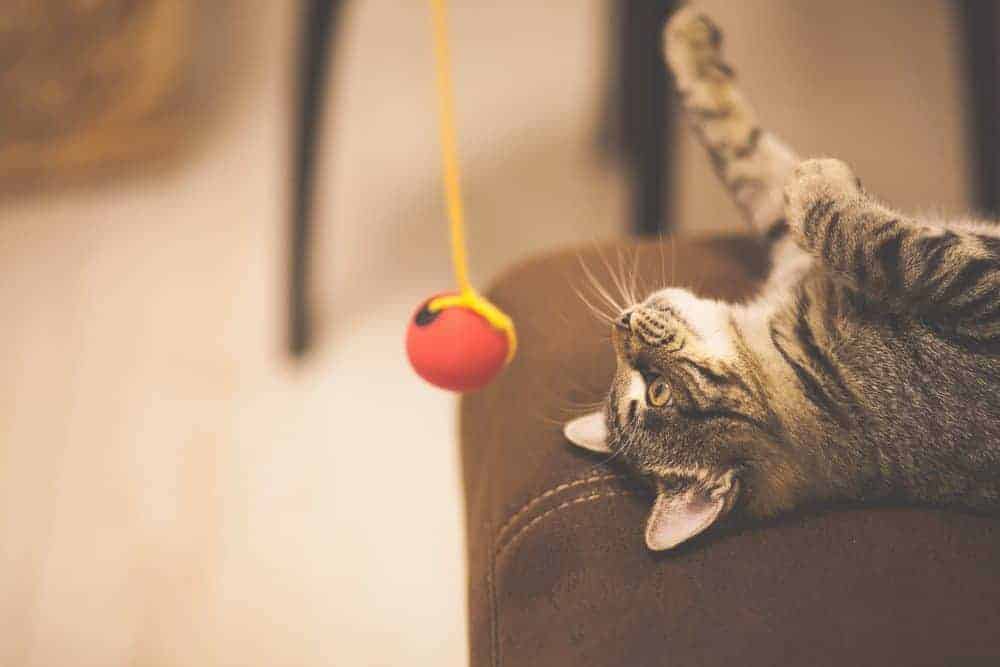
There are many different reasons why some cats are kept permanently indoors – such as cats with disabilities who may be blind or deaf, or because their owners live in a flat or by a busy road. Some older, more timid cats may prefer to stay warm and safe indoors, well away from the hazards of the great outdoors.
While keeping a cat permanently indoors ensures they are safe, it’s important that they are provided with plenty of activities to enable them to display a normal range of behaviours that keep them mentally alert and physically fit.
Did you know?
According to International Cat Care, only about 10% of cats are believed to live permanently indoors in the UK, although the figure is increasing. In a totally indoor situation, the charity advises starting with two kittens, instead of one, so they can be companions and playmates.
Territory: This is very important to every cat and indoor felines should have access to several rooms, so they have lots of places to explore, investigate and scent mark. Also provide a range of different resting places – from cosy cat igloos at floor level to higher look-out spots that are safe for your cat to access.
Scratching: This is an essential part of being a cat and fulfils several important functions. It keeps claws in optimum condition by removing the outer husk and exercises the muscles of the forelimbs and spine. Scratching is also used as a form of territorial communication. Scent and sweat glands in between the pads of the feet produce a unique smell. When claws are scraped down a surface, the scent is deposited, which is one of the reasons why cats love to scratch furniture, walls and carpets. An indoor cat must be provided with a range of good scratching posts in different locations around the house. Cat welfare charity International Cat Care has a useful guide on how to choose and use a scratching post.
Hunting: Cats can become frustrated and bored with indoor-only lifestyles. Encouraging exercise is particularly important to avoid obesity, which can result in major health problems such as heart disease, osteoarthritis and diabetes. Stalking and pouncing are innate cat behaviours, so it’s vital to spend a good chunk of the day playing with your indoor cat to enable them to enjoy these activities. From cardboard boxes to hide in to fishing rod toys and laser pointers, gather an array of stimulating toys for your feline friend to stalk, pounce and hunt with. Remember that as your cat doesn’t have the freedom to interact with people or other animals outside, you are their main companion and you should spend lots of time interacting with them every day.
Grazing: Although cats are obligate carnivores, which means they need to eat meat to survive, outdoor cats will often nibble on grass and herbs. To mimic this, provide an intoxicatingly scented indoor window box with grass, catnip (Nepeta), thyme, sage and parsley.
Feeding: In the wild, cats would have to work for their food, feeding on several small rodents every few hours, rather than eating a bigger meal, handed to them on a plate, twice a day. According to the world’s leading feline experts, providing domestic cats with the opportunity to put some effort into getting their paws on the edible prize, could have a big effect on their health and wellbeing. Introducing puzzles containing dry food that the cat has to work to get will provide mental stimulation and help keep them in trim. You can find out more about cat feeding puzzles here
For indoor cats of all ages, Burgess cat food comes in a range of options: Kitten, Adult and Mature. Our unique recipes contains elevated levels of protein to support obligate carnivores, taurine for a healthy heart and essential fatty acids for a healthy skin and shiny coat. We also add natural antioxidants to help support your cat’s immune system and natural prebiotics for a healthy gut.
The RSPCA has a useful guide, Meeting the Needs of Indoor Cats, which you can download here
Sources: icc.org.uk, rspca.org.uk














